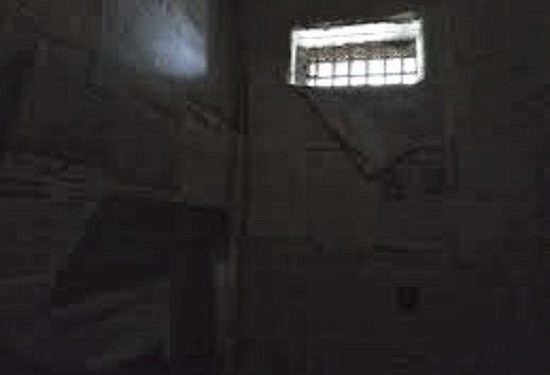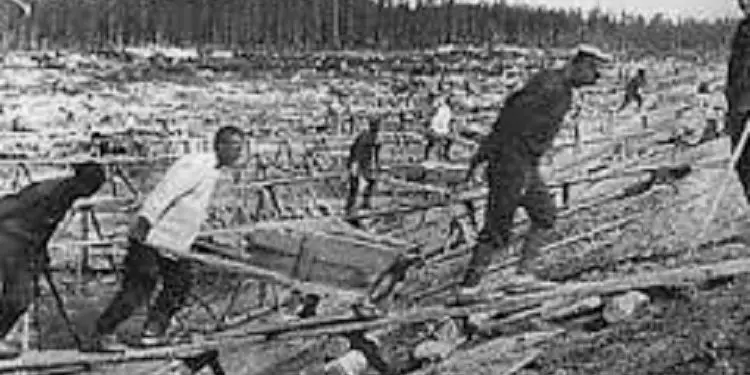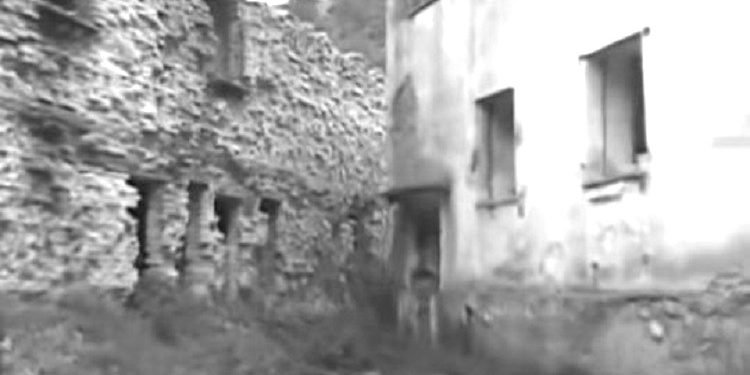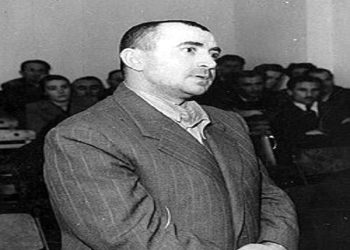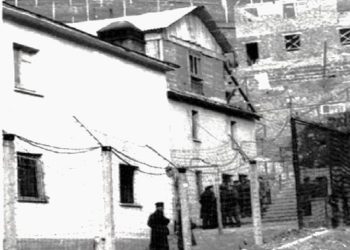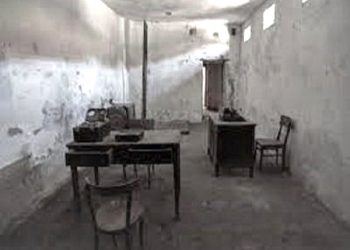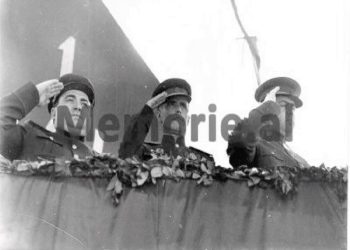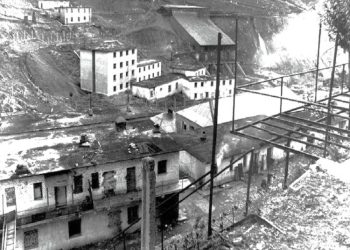Memorie.al / Hysen Haxhiaj, through his memories, bring us both comical and tragic episodes that of the bitter humor that the prisoners managed to do, even with serious consequences for them. Today they are another version of prison literature. For this, the man who went through the multiple ordeals of successive prisons for political reasons has written numerous memoirs. Which in most cases are very heavy? As they have deep tragic notes. They are memories conceived in the hell of the Spaçi galleries, where the new modern motifs of the Dantesque hell came to life.
Where he descended after the punishment he received, up to 2500 meters deep, a depth that even Dante himself had not imagined. Hyseni was re-sentenced with the same political motives. And from Spaçi, he traveled from Ballshi, Vlora, Zejmeni, Qafë-Bari, to end up in the infamous Burrel prison. Hyseni has brought to memory, those who no one can forget, what sufferings he has removed with his friends. Friends of cells who stopped living, as a result of despair, inhumane torture or hard work, which they were forced to do.
Among the mountain of pain he has brought, Hyseni, as a careful man, has not forgotten to bring some memories with a note of humor, which also make up the black humor of the prison. Some of them he described with telegraphic lines in the book, some we took note of in a meeting with him, about his biography in prisons, as well as about the sparks of humor that ignited in them.
The prisoner’s “radiolo” for the US 6th Fleet
Hysen Haxhiaj tells how this “radio game” was created, authored by the prisoner Kosta Gjoka. Who has already passed away? “Kosta,” Hyseni remembers, “was from a communist family, from Berat, and fate met him as a prisoner, in the labor camp at the salt mines of Narta in Vlora. In the prison he served as a warden. He even kept water cans in a shed. One day, when the media had announced that the US 6th Fleet was maneuvering in the Mediterranean, he was shot playing a “sketch” with prison officers.
The scene was the prisoners’ barracks. The material base consisted of an empty meat box and an ordinary nail. Spectators of this absurd theater were two policemen from the prison command. That they always had sharp ears, so that the situation did not get out of control and the vigilance required by the command.
They were separated only by plywood. When Kosta was convinced that the police were listening, he took the can of meat and started hitting it with a nail, imitating the Morse alphabet: – “Drink, drink, drink. Here the US 6th Fleet. We are waiting for you. We are waiting for you to take Tirana. Drink, drink, drink…”, – etc.
The two captains, when they heard this kind of neatly improvised broadcast by the “actor”, the warden of the Kosta Gjoka prison, really remembered that someone from the prisoners was connecting to the radio transmitter and plotting, and after they were convinced that they had made a discovery great “patriotic”, announced the command, which immediately gave the alarm.
The finale of this “sketch” was tragic-comic. Hyseni remembers the horror he experienced: “Oh great god. The policemen entered us with pickaxes and shovels, all 1000 prisoners, without exception, and in the end they lined us all up as we were, covered in blood from the blows, with broken legs and hands, cracks on our heads and faces.
The commander and commissar come and shout: – “Get out the radio and the one who has it, or we will take all of your souls”! Hysen Haxhija continues the story: “Kosta, who was just captured by the executioners, shouted: Hey, are you in your right mind, why did you die for us?! Where is the radio here?! I made fun of the captains, with a nail and a can”.
At the moment, the policemen verified that there was no radio and that this entire ruckus was really a prank, played at one point by the prisoner from Berat. What did Kosta do, what he removed afterwards, for this artistic value realized in prison! They broke it down.
Rare episode: The prison spy, denounces himself!
Even this type of “art” really flourished in the prisons of the dictatorship, according to the testimony of Hysen Haxhi. Correspondence of prisoner agents with prison operatives. To unprecedented humorous proportions. As in this case that we are presenting to the reader. Hyseni remembers: “It was one after midnight. I fall asleep and open my eyes.
I get up slowly and I carefully see a prisoner, wondering what he was doing. B.V. was writing upside down on his bed. Our rooms were for 50 people with 3 bunk beds. It was beneath me. I craned my head carefully and read what he was writing. To my surprise, absorbed in his fantasy of spy and portable witness, I saw that he was writing to himself. I couldn’t believe my eyes! In the letter he was writing, he begged the Party to forgive him for having made propaganda against popular power.
I couldn’t stand it and asked him: “Why are you confessing, what are you doing”?! While he, – remembers Hyseni, – answered me: – “I’m done spying for everyone, but now I need a plan, that’s why I’m writing for myself. I am reporting”. Hyseni remembers: “My eyes turned black. I spat at him and slapped him hard. He burst out of rage and screamed at the top of his lungs. I understood that I would go to the dungeon after that. I shot a couple more and threw him off the bed…! For this, I was sentenced to a month in the dungeon.”
How was a tunnel “opened” in the Burrel prison…for a cigarette?!
Yes, in prison, the nail was not only used to connect with the 6th American Fleet. In the political prison of Burrell, with a nail, the prisoner GJ.K. Improvised the opening of a hypothetical tunnel. For this humorous occasion, Hyseni remembers. Cigarettes were very expensive in prisons, especially in Burrel prison. A prisoner, who is no longer alive, often asked his cellmates for cigarettes, which sometimes they didn’t even give him.
To take revenge, at 02.00 at night, he goes out to the window with a bowl that scratched him, and this created the idea that someone from inside the room was digging to open a tunnel. When the soldier approached the window, he spoke with an intonation to protect the secret: -“Come on, the soldier came”! He repeated it several times, so that the soldier heard his words well. It was February 1978. Night had fallen and it was drizzling. The soldier fires a machine gun. Alarmed watch officer arrives. The soldier reports to him that inside the prison room, a tunnel was being opened.
The soldier tells the superior that one of the prisoners is standing at the window and when he approached the window, someone called out to his comrades: “Rest! The soldier came”! The alarm was raised at 02.20 am. “They took us out with mattresses and quilts. Torture and control everywhere. Only when they were convinced that there was no trace of a tunnel, they allowed us to enter again.
In the morning, the chest asks his friend for a cigarette, saying: – Will you give me a cigarette, or will I take you out again tonight? – You got a dog; did you do that crap to us last night?!- screamed his crazy friend and attacked him with fists. While we laughed, – says Hyseni, – holding his stomach with his hand…! We laughed until the police came. They took both. They beat them and put them in the dungeon.” This was also the epilogue of such initiatives, with notes of humor in prison.
How the author of “Radio-loja” “falsified” his diploma from prison
The prisoner from Berat, who made the famous “radio game”, managed to insert a fake “Diploma” from the Faculty of Civil Engineering into the files of the Ballshi prison command and become a project manager in the construction of a bridge. In the meeting with Hysen Haxhina, we asked him about the fate of the famous Ujar who developed the radio game from prison with the 6th American Fleet. He told me about another “undone” of his, as he had a developed imagination and initiative spirit.
Kosta Gjoka, Asllani said, had heard that a person with his name had finished his studies in civil engineering. After making sure of this, he sends one of his own and pulls to this faculty, a certificate that showed that Kosta, in this case he knew about the prisoner, had finished higher studies in engineering. After falsifying his birthday and place of birth, he presents this evidence to the prison command, in order to fix him somewhere at work, with this “profession”.
The command needed such a professional, to direct the construction of a bridge at the Ballsh Plant, at the Oil Refinery.
The bridge began to be built under the direction of the “engineer”, but it did not last long and collapsed. When the command started the investigation, it turned out that the engineer was a fake. He had managed to deceive the command. They broke it down. Hyseni says that he was probably one of the first falsifiers of a high school diploma, since at that time; he was looking for money to do it. Today, with fake diplomas, they are flocks…but in those days it was different…! “Now, continues Asllani’s story, – the famous engineer of the Ballsh bridge, has been separated from life for about seven years. Memorie.al





